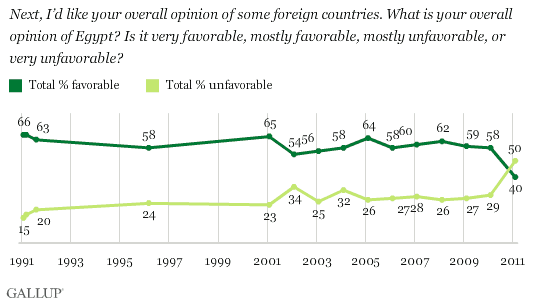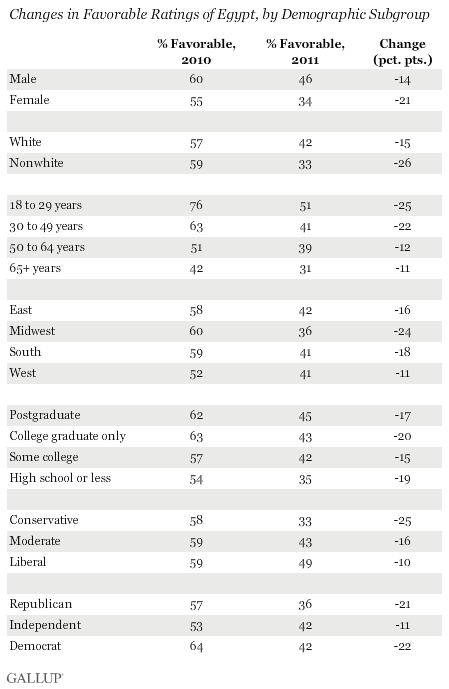PRINCETON, NJ -- Americans' opinions of Egypt have become sharply more negative, with an 18-percentage-point drop in the country's favorable ratings -- from 58% in 2010 to 40% this year. For the first time since Gallup's initial measurement in 1991, more Americans have a negative than positive view of Egypt.

These results are based on Gallup's annual World Affairs poll, conducted Feb. 2-5.
The more negative rating of Egypt comes in the midst of extensive news coverage of the massive political demonstrations and push for regime change in that country. The same poll finds that most Americans are sympathetic to the anti-government protesters and think the changes taking place in Egypt are good for that country as well as for the United States.
To a large extent, Americans' ratings of foreign countries seem to be influenced by each country's foreign policy and particularly their orientation toward the United States, with nations like Great Britain and Canada typically rated most positively, and Iran and North Korea least positively. Gallup will provide the full 2011 update on country ratings later this week.
Egypt's higher favorable ratings in the past likely stemmed from the country's generally friendly relations with the United States. But the decline in Americans' favorability toward Egypt this year may be a result of the protests that have made Americans more aware of longtime President Hosni Mubarak's largely autocratic rule.
Americans' opinions of Egypt do not vary to a meaningful degree based on their level of attention to the demonstrations and political crisis there. Favorable ratings are 43% among those following the story very closely and 39% among those following the story somewhat closely or not closely.
The decline in Americans' positivity toward Egypt is broad-based, with each key demographic subgroup showing at least a 10-point decline in favorable ratings. The largest drops in favorability toward Egypt over the past year have come among nonwhites, conservatives, and young adults.
The net result of these changes is that young adults are the only group in which a majority currently holds a favorable opinion of Egypt. Last year, all major subgroups except senior citizens did.

Implications
Americans' views of Egypt have been substantially affected by the protests in that country, shifting from consistently positive opinions to generally negative ones for the first time in two decades. Americans are overwhelmingly sympathetic to the anti-government protesters in Egypt. So if the current government, or a new one, enacts some of the protesters' reforms while remaining largely pro-United States, that could restore Americans' positive feelings toward Egypt.
Survey Methods
Results for this Gallup poll are based on telephone interviews conducted Feb. 2-5, 2011, with a random sample of 1,015 adults, aged 18 and older, living in the continental U.S., selected using random-digit-dial sampling.
For results based on the total sample of national adults, one can say with 95% confidence that the maximum margin of sampling error is ±4 percentage points.
Interviews are conducted with respondents on landline telephones (for respondents with a landline telephone) and cellular phones (for respondents who are cell phone-only). Each sample includes a minimum quota of 150 cell phone-only respondents and 850 landline respondents, with additional minimum quotas among landline respondents for gender within region. Landline respondents are chosen at random within each household on the basis of which member had the most recent birthday.
Samples are weighted by gender, age, race, education, region, and phone lines. Demographic weighting targets are based on the March 2010 Current Population Survey figures for the aged 18 and older non-institutionalized population living in continental U.S. telephone households. All reported margins of sampling error include the computed design effects for weighting and sample design.
In addition to sampling error, question wording and practical difficulties in conducting surveys can introduce error or bias into the findings of public opinion polls.
View methodology, full question results, and trend data.
For more details on Gallup's polling methodology, visit www.gallup.com.
